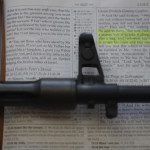We run our website the way we wished the whole internet worked: we provide high quality original content with no ads. We are funded solely by your direct support. Please consider supporting this project.

Jesus Said, “Buy a sword.” What did he mean?
Yesterday, I challenged the common assumption that Jesus was violent when he drove out the animals and turned over tables in the Temple courts. (See post.) Today I want to look at the second episode some site to suggest Jesus wasn’t totally opposed to violence. It takes place just before Jesus and his disciples leave to go pray at the Garden of Gethsemane. Jesus first had his disciples recall the missionary expedition he had recently sent them on. To teach them total dependence upon God, Jesus had forbidden them to take any provisions on this journey (Luke 9:3). Jesus asks them, “When I sent you without purse, bag, or sandals, did you lack anything”? “Nothing,” they all responded (Luke 22:35).
Then Jesus said, “But now if you have a purse, take it, and also a bag; and if you don’t have a sword, sell your cloak and buy one. It is written: ‘And he was numbered with the transgressors’; and I will tell you that this must be fulfilled in me. Yes, what is written about me is reaching its fulfillment” (vs. 36–37).
The disciples happen to have two swords with them, so they showed them to Jesus. “That is enough” he replied (vs. 38).
Does this episode warrant the conclusion that Jesus expects his followers to engage in violence in certain circumstances? A close reading of the text reveals that it teaches nothing of the sort.
First, when Peter used the sword against those who were arresting him, Jesus responded “No more of this!” and healed the man’s ear that was cut off. Jesus rebuked him and told him to put it back in at sheath where it belongs (Luke 22:47-51). When Jesus appears before Pilate he gives the fact that his followers are not fighting as proof that his kingdom “is not of this world.” In this light, it seems clear, whatever Jesus had in mind in telling his disciples to bring swords along with them, it wasn’t for them to ever use them.
What other reason might Jesus have had for making his disciples bring swords? The answer is provided by Jesus himself as explains that it was to fulfill the prophecy, “He was numbered with the transgressors” (Is 53:12). To fulfill prophecy as well as to further force the hand of the authorities, if necessary, Jesus and his band of disciples had to appear to be criminals. More specifically, they had to appear like a typical band of sword wielding zealots, thus justifying the arrest and eventual execution of their leader.
This explains why Jesus says, “It is enough,” when the disciples produce only two swords. If Jesus expected his disciples to actually engage in sword fighting, two swords would obviously be completely inadequate. But for the mere purpose of appearing to be a band of lawbreaking zealots, two swords would suffice.
In light of this, it seems to me that justifying the use of violence by citing this passage is as unwarranted as citing the temple cleansing passage to this effect.
As MennoNerds, we all have found certain distinctives of Anabaptism to be central in our expression of faith. This article is part of a MennoNerds Synchro-Blog in the month of May on Anabaptism.
To find all the other articles in the Mennonerds on Anabaptism synchro blog click here.
Category: Q&A
Tags: Mennonerds, Non-Violence, Violence
Topics: Enemy-Loving Non-Violence
Related Reading

Who is Responsible for Job’s Suffering?
In the prologue of the Book of Job, the author seems to ascribe the responsibility for Job’s affliction to Yahweh. For instance, Satan challenges God to “stretch out [his] hand and strike everything he has,“ believing that this would incite Job to curse God to his face (1:11). The fact that the Lord responds by…

Did Jesus Instruct Us to Arm Ourselves?
Over the past few posts, I’ve been dealing with the passages that are frequently used to argue how Jesus condoned violence. One of these takes place just after the last supper and just before Jesus and his disciples were going to travel to the Mount of Olives to pray. To prepare his disciples, Jesus tells them;…

Violent Thinking
When most people think of violence, they think of physical violence. But the truth is that our actions are only violent because our hearts and minds are violent first. For this reason, Jesus emphasizes purging violence from our minds as much as from our physical behavior. In Matt 5:21-26, he reminds us of the OT…

The Principle of Non-Violence
Several years ago, Woodland Hills Church hosted a Q&A with Greg Boyd and Paul Eddy to answer questions that arose from their exploration of Anabaptism. In this short clip, they address the Anabaptist principle of non-violence, and point out that this principle goes far beyond refraining from external violence. The call to non-violence is grounded in our…

Cross-like Love and Non-Violence
Cosmo Spacely via Compfight Though it seems to have been forgotten by many today, the cross wasn’t simply something God did for us. According to the NT, it was also an example God calls us to follow. Hence, after John defined love by pointing us to Jesus’ death on the cross on our behalf, he…

Podcast: Must a Kingdom Pacifist Be a Political Pacifist?
Greg discusses different levels of pacifism. http://traffic.libsyn.com/askgregboyd/Episode_0213.mp3
